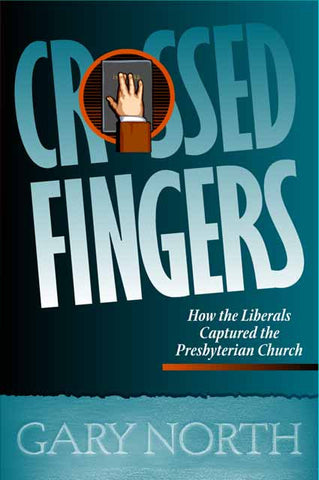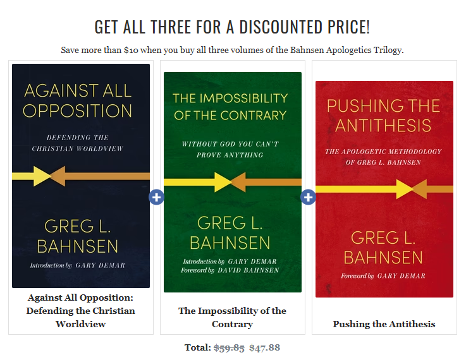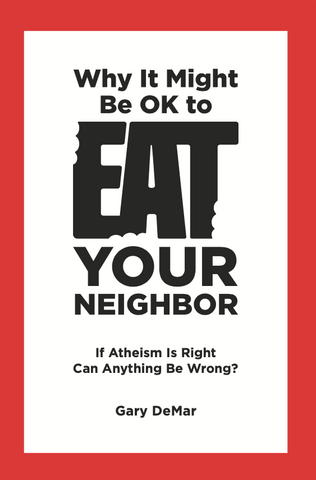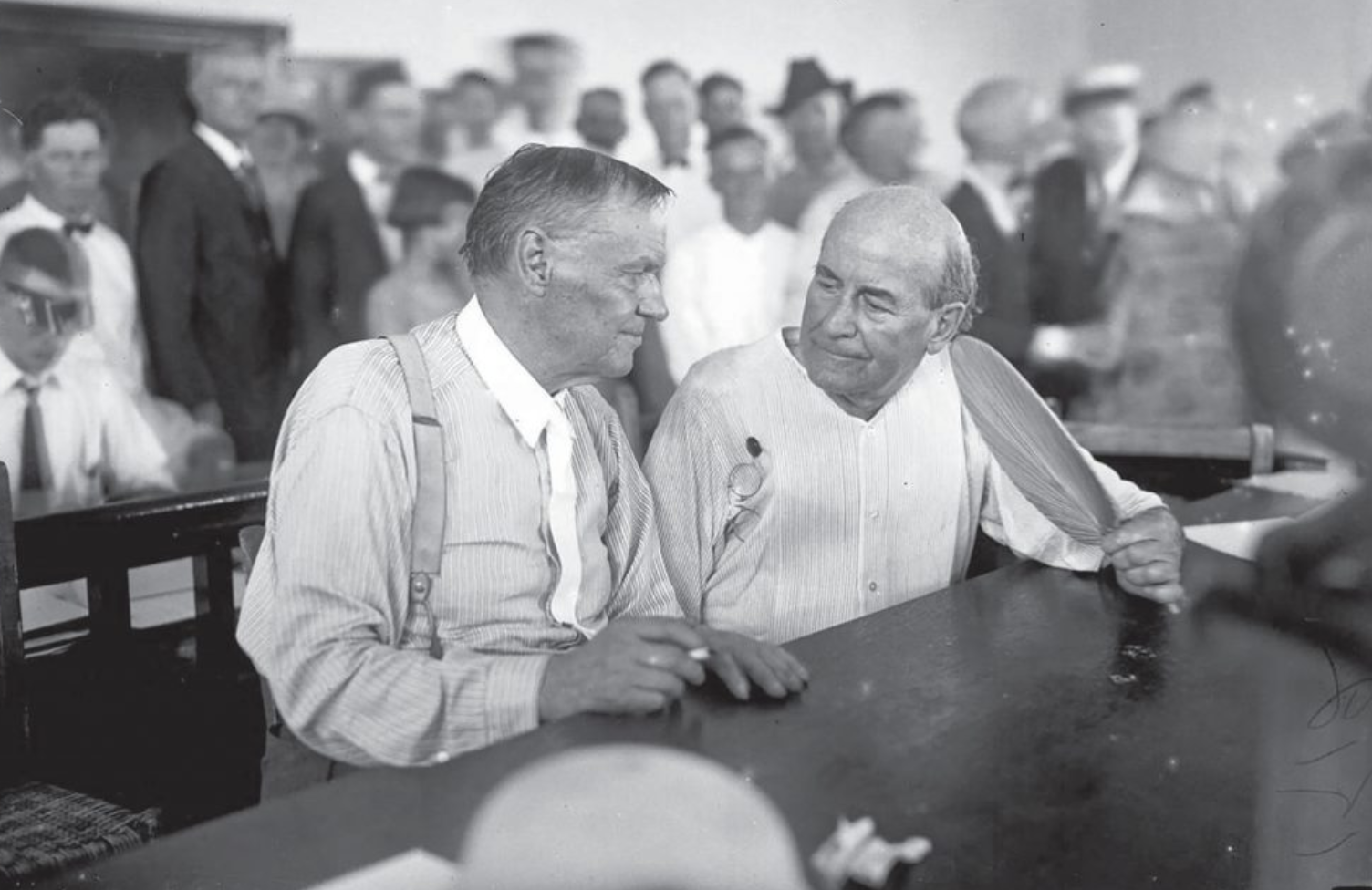The year 2025 is the 100th anniversary of the Scope’s Trial. Mark A. Noll’s review [1] of Garry Wills’ Under God: Religion and American Politics forced me to look at Wills’ perspective on the infamous Scopes Trial. Most of what America knows of the Scopes “Monkey” Trial held in Dayton, Tennessee, in 1925, comes from the fictionalized stage play and screen version titled Inherit the Wind.[2] William Jennings Bryan saw the sinister social implications of evolution. This is why he took the case. It would be his last. He raised this warning:
“We must be careful how we apply this doctrine of the strongest.” Bryan feared what came to be known in the next decade as “social Darwinism”—the idea that human society is an arena of struggle in which the strongest prevail, the fittest survive, and poor “misfits” must be neglected in the name of progress through “betterment of the race.”[3]
Be sure to see Dr. Gary North’s chapter “Darwinism, Democracy, and the Public Schools” from his book Crossed Fingers (that sells online for more than $100 if you can find a copy). I cover elements of the Scopes’ Trial in my book Why It Might be OK to Eat Your Neighbor: If Atheism is Right Can Anything be Wrong? The effects of that trial (even though Bryan won) have had a devastating effect on how public school children see their world.

Crossed Fingers
Crossed Fingers is the first book to identify and discuss in detail the five points of liberalism and the rival theological positions. This fully-documented tome is a handbook for the diagnosis and defeat of the same liberal forces that have captured American Christianity. How did they do it? With a vision, with a plan, and with other people's money. Crossed Fingers shows how they achieved victory in what had been the most theologically conservative large Protestant denomination on earth. It also shows what the conservative Presbyterians could have done, and still have not done, to immunize the Church.
Buy NowAs it turns out, Bryan was not alone in his understanding of the potential effect of consistent Darwinism. In fact, Bryan’s legal antagonist, Clarence Darrow, agreed with Bryan’s assessment of the potential social implications of biological Darwinism and fully supported its ramifications! In 1924, Darrow defended the teenage “thrill killers” Nathan Leopold and Richard Loeb.[4] These two self-professed “superiors” killed 14-year-old Bobby Franks for sport, to demonstrate their peerless intellects. Darrow argued for leniency for Leopold and Loeb. Instead of the death penalty, Darrow “got the idiots off with life imprisonment. Nathan Leopold was released in 1958 and lived to the age of 66….”[5] What justification does Darrow give for the murder?
Why did they kill little Bobby Franks? Not for money, not for spite, not for hate. They killed him as they might kill a spider or a fly, for the experience. They killed him because they were made that way. Because somewhere in the infinite processes that go to the making up of the boy or the man something slipped, and those unfortunate lads sit here hated, despised, outcasts, with the community shouting for blood.[6]
Bryan, Darrow, and Scopes were minor players compared to the efforts of H. L. Mencken who saw an opportunity in Dayton and seized upon it with the resolve of a Hercules. In the days before television, print journalists were as famous as TV anchormen. Mencken was to newspaper reporting what Walter Cronkite, Peter Jennings, and Dan Rather were to television reporting.
The testimony at the Scope’s trial was heard by the judge but not the jury. In addition, Bryan’s disastrous comments as an “expert witness on the Bible and evolution” were never entered into the trial record. But thanks to Darrow’s journalist friend H. L. Mencken, this “expert testimony” was read by millions of people in daily newspapers. “Thanks to Mencken and to Inherit the Wind, a 1950s play that continually re-creates (quite inaccurately) the famous trial on stage and on the screen, Bryan is now best known as the fuddled biblicist of Dayton, looking like a beached whale himself as he tried to explain Jonah’s mode of transportation.”[7]
The trial was more than a fight over the Bible and the biblical understanding of creation. Mencken saw in Bryan, a strident populist, a target for his anti-populist ideas based on the social implications of evolution. Mencken was a student and admirer of Nietzsche’s “superman” (Übermensch) philosophy. In 1908 Mencken published The Philosophy of Nietzsche where he argued that Nietzsche “had supplied the philosophy for modern Germany’s ruthless efficiency, in which Mencken took an ethnic pride.”[8] Nietzsche proposed that the strong must grow stronger and waste no strength in the ineffective task of trying to lift up the weak. Mencken was a Nietzschean “literalist” in applying Darwin to human ethics.
[T]he struggle for existence went on among the lions in the jungle and the protozoa in the sea ooze, and . . . the law of natural selection ruled all of animated nature—mind and matter—alike.[9]
Mencken understood where evolution would take man. For Mencken, blacks, women, and Jews were to be repressed. “In fact, the oppression of blacks was one sign of the white man’s superiority.”[10] Later evolutionists repudiated Mencken’s worldview, but with little rational justification. Darwin, however, made such an application in his The Origin of Species by Means of Natural Selection, or the Preservation of Favored Races in the Struggle for Life. Darwin’s supporters claim that his use of “races” was meant to describe subspecies of animals. To a certain degree, this evaluation is true. But what did Darwin mean by “subspecies”? What if Darwin thought of non-whites as “subspecies” of animals? In his evolutionary sequel, The Descent of Man, Darwin wrote:
At some future period, not very distant as measured by centuries, the civilized races of man will almost certainly exterminate and replace the savage races throughout the world. At the same time the anthropomorphous apes . . . will no doubt be exterminated. The break between man and his nearest allies will then be wider, for it will intervene between man in a more civilized state, as we may hope, even than the Caucasian, and some ape as low as a baboon, instead of as now between the negro or Australian and the gorilla.[11]
Darwin believed that the various races were at different evolutionary levels, all distant from the apes, with Blacks at the bottom and Caucasians at the top. Thomas H. Huxley, an ardent defender of Darwin who garnered the nickname “Darwin’s Bulldog,” believed that “No rational man, cognizant of the facts, believes that the average negro is the equal, still less the superior, of the white man.” Huxley described whites as “bigger-brained and smaller-jawed.”[12] Richard Hofstadter, in Social Darwinism in American Thought, demonstrated “that Darwinism was one of the chief sources of racism and of a belligerent ideology which characterized the last half of the 19th century in Europe and America….”[13] Greg Bahnsen’s apologetic’s books will help you deal with the operating assumptions of unbelieving thought at the foundational level.

Bahnsen Apologetics Trilogy
Get the set for a discounted price! Save more than $10 when you buy all three volumes of the Bahnsen Apologetics Trilogy.
Buy NowThe theory of evolution became the philosophy of life for militant atheism in the 20th century. Few people realize that Hitler, in bringing about World War II, merely put into practice what he believed was human evolution. Darwin and Nietzsche were the two philosophers studied by the National Socialists in working out the philosophy set for in Hitler’s Mein Kampf. In this work Hitler asserted that men rose from animals by fighting. It was the contention of the Fuehrer that this struggle, wherein one being feeds on another and the blood of the weaker is the life of the stronger, has continued from time immemorable and must continue until the most highly advanced branch of humanity dominates the whole earth.
The biology text used in the Dayton school system was George William Hunter’s Civic Biology (1914), the best-selling text at the time. Hunter’s work was “heavily laced with the scientific racism of the day. According to Hunter, ‘simple life forms of life on earth slowly and gradually gave rise to those more complex.’ Humans appeared as a progressive result of this evolutionary process, with the Caucasian race being ‘finally, the highest type of all.’”[14]
Racism has been with man since the dawn of sin. We cannot claim, therefore, that evolution gave rise to racism.[15] Evolution only made the practice respectable because it justified racial attitudes and practices based on “science.” Darwin’s defenders don’t like to talk about Darwinism’s dirty little secret. “Darwin’s racial and sexual views permeated his discussion of the origin of species and especially of the descent of man. His contemporaries were shocked by the notion that human beings had evolved from primates. Now many people are shocked by his racism.”[16]
We’re entering a time when operating assumptions about the real and unreal are being put to the test. All ideas have consequences, good or bad. There is no third way. Those who deny the existence of God must experiment with operating assumptions. They can never know what will work because their worldview does not operate in terms of fundamental truths. Their “truths” are manufactured as we seen with the LGBT+ crowd and climate alarmists. Science was often said to be the ultimate presupposition, but that is no longer true even among some scientists.
Physicalism reigns supreme, but it can’t account for anything that is not material, and there are many “things” that are not material. Consider the following: love, morality, compassion, grief, logic, reason, mathematics, the mind, good, evil, intelligibility, purpose, truth, knowledge, coherence, the uniformity of nature, and objective value and worth.

Why It Might Be OK to Eat Your Neighbor
The most damning assessment of a matter-only cosmos devoid of a Creator is that we got to this place in our evolutionary history by acts of violence whereby the strong conquered the weak with no one to support or condemn them. Why It Might Be OK to Eat Your Neighbor repeatedly raises the issue of accounting for the conscience, good and evil, and loving our neighbor. It’s shocking to read what atheists say about a cosmos devoid of meaning and morality.
Buy NowAnyone who claims that human beings are only meat machines is delusional. Their delusion is contained because most physicalists are not consistent. We are thankful for that. There is more to us than the physical properties of DNA.
If you’ve ever seen the 1957 film The Incredible Shrinking Man, based on Richard Matheson’s 1956 novel The Shrinking Man, the film ends with the central character, Scott (played by Grant Williams), accepting his fate as he shrinks to subatomic size but does not deny his humanity.
Would he find ethical norms listed as he shrinks? Justice, good and evil, and the other forementioned non-physical realities? As he becomes even smaller, we hear his thoughts as the film ends: “All this vast majesty of creation, it had to mean something. And then I meant something too. Yes, smaller than the smallest, I meant something too. To God, there is no zero. I still exist.” Why? Because we are more than matter.
This brings me to a film adaptation to Agatha Christie’s Hallow’en Party titled A Haunting in Venice (2023). The following is from Collin Garbarino’s review in World magazine:
In Christie’s novels, Poirot is partly motivated by a sense of divine justice, but [Kenneth] Branagh’s Poirot has confronted the problem of evil and lost his faith.
The previous movies [Murder on the Orient Express deals with revenge and Death on the Nile greed while A Haunting in Venice is about whether there’s something beyond us] set up this world-weary version of Poirot. He has a brilliant mind, but he’s tortured by loss. He says he doesn’t believe in God, but he wishes he could because without God life has no meaning. It’s his disbelief that’s driven him into his reclusive retirement. If in the end life has no purpose, what’s the point of searching for truth and justice?[17]
Again, presuppositions matter. Why bother with a world that can’t account for truth or falsehood justice or injustice? You can only go so far with wishful thinking.
[1] Mark A. Noll, review of Under God: Religion and American Politics by Garry Wills, First Things 14 (June/July 1991), 43.
[2] For a very helpful analysis of the Scopes trial and its misrepresentations by the Inherit the Wind play and movie, see John Eidsmoe, The Christian Legal Advisor (Grand Rapids, MI: Baker Book House, 1984), 201-212.
[3] Garry Wills, Under God: Religion and American Politics (New York: Simon and Schuster, 1990), 101.
[4] See the film Compulsion (1959), a fictionalized version of the Leopold-Loeb case, starring Dean Stockwell, Bradford Dillman, and Orson Welles as the Clarence Darrow character.
[5] Lance Morrow, “A Boy Dies in the ’90s,” Time (October 20, 1997), 120.
[6] Quoted in Herbert W. Titus, God, Man, and Law: The Biblical Principles (Oak Brook, IL: Institute in Basic Life Principles, 1995), 14.
[7] Wills, Under God, 99.
[8] Wills, Under God, 104.
[9] H. L. Mencken, The Philosophy of Friedrich Nietzsche (Kennikat reprint of 1908 edition, 1967), 102-3. Quoted in Wills, Under God, 102.
[10] Wills, Under God, 103.
[11] Charles Darwin, The Descent of Man, 2nd ed. (New York: A. L. Burt Co., 1874), 178. Quoted in Henry M. Morris, The Long War Against God: The History and Impact of the Creation/Evolution Conflict (Grand Rapids, MI: Baker Book House, 1990), 60.
[12] Thomas H. Huxley, Lay Sermons, Addresses and Reviews (New York: Appleton, 1871), 20. Quoted in Morris, The Long War Against God, 60.
[13] Raymond F. Surburg, “The Influence of Darwinism,” in Darwin, Evolution, and Creation, ed. Paul A. Zimmerman (St. Louis, MO: Concordia 1959), 196.
[14] George William Hunter, A Civic Biology: Presented in Problems (New York: American, 1914), 194-96, 405. Quoted in Edward J. Larson, Summer for the God’s: The Scopes Trial and America’s Continuing Debate over Science and Religion (New York: Basic Books, 1997), 23-24.
[15] Richard Hofstadter, Social Darwinism in American Thought, rev. ed. (Boston, MA: Beacon Press, [1944, 1955] 1967), 171-172.
[16] Joyce Appleby, Lynn Hunt, and Margaret Jacob, Telling the Truth About History (New York: W.W. Norton and Co., 1994), 184.
[17] Collin Garbarino, “A Haunting in Venice,” World (October 7, 2023), 34. The online version of the article can be found here: https://wng.org/articles/a-haunting-in-venice-1694796969

